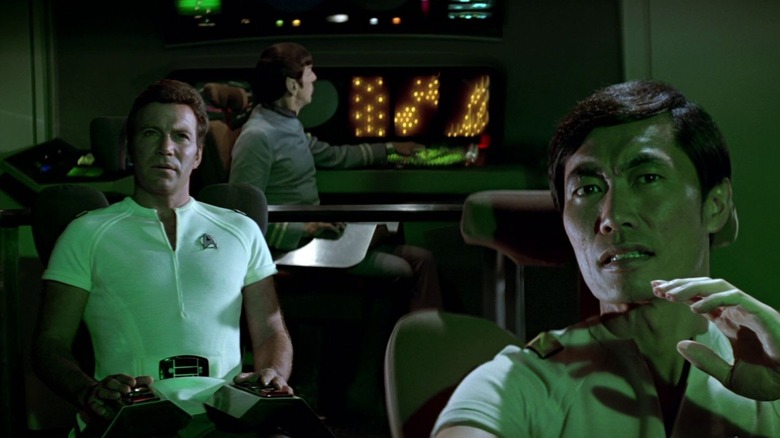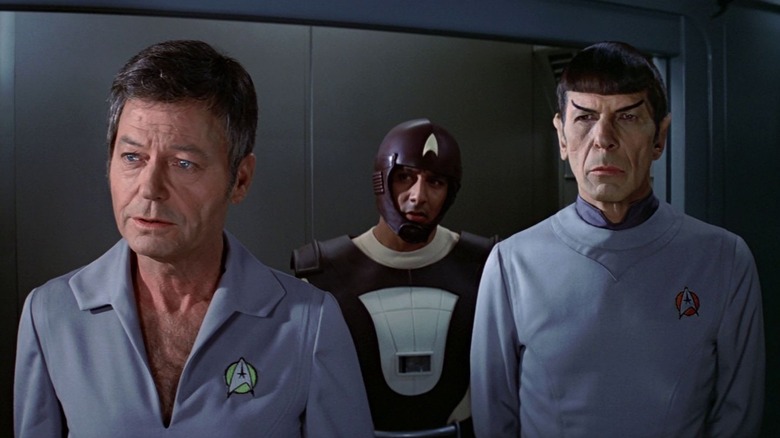Star Trek: The Motion Picture's First Directorial Choice Went On To Helm Another Sci-Fi Classic
We may receive a commission on purchases made from links.
When "Star Trek: The Motion Picture" was still in development back in the mid-1970s, it was kind of a story free-for-all. Several venerable authors were working on several story ideas, and scripts were being banged out by the likes of Ralph Ellison, Ray Bradbury, Robert Silverberg, and "Star Trek" regular John D.F. Black. "Star Trek" creator Gene Roddenberry was also in the mix, and he was, in about 1976, working on a story with the young aspiring writer/producer John Povill. The pair came up with a fun parallel universe tale, but the idea was, however, not considered "epic" enough by Paramount. Development continued for a few more years.
Eventually, Povill began looking for directors as well, and he didn't want to start small. Povill suggested that Francis Ford Coppola might direct, or perhaps one of those hit-making young upstarts, George Lucas or Steven Spielberg. What an odd world we would live in if George Lucas had made "Star Trek: The Motion Picture." He also suggested Robert Wise, the director of "The Sound of Music" and "The Day the Earth Stood Still," although all of the above directors turned the project down. The budget was too low, some reportedly said. This was all covered in the 1980 sourcebook "The Making of Star Trek: The Motion Picture" by Roddenberry and Susan Sackett.
That book also backed up a story first printed in a 1979 New York Times article explaining that Philip Kaufman originally signed on to direct "Motion Picture." At the time, Kaufman was known for directing the thriller "The White Dawn" and for writing the Clint Eastwood film "The Outlaw Josey Wales." Kaufman, totally comfortable with sci-fi, ended up leaving the project and went on to direct the noted 1978 remake of "Invasion of the Body Snatchers."
Philip Kaufman originally signed on to direct Star Trek: The Motion Picture
The New York Times article only mentioned that Kaufman left "Star Trek: The Motion Picture" before shooting began, and that he jumped over to the remake of "Invasion of the Body Snatchers." That was the version with Donald Sutherland, and it is just as celebrated as the 1956 original. "Body Snatchers," it should also be noted, was a big hit, making almost $25 million.
Sackett's and Roddenberry's book goes into a little more detail, noting that Kaufman signed on and was immediately put to work with "Star Trek" homework. Roddenberry arranged a screening at Paramount, allowing Kaufman to watch 10 classic episodes to give him an overall feel for the show (this was long before home video, so it was far more difficult to access the entire series from home). Kaufman was also paired with screenwriters Chris Bryant and Allan Scott, who collectively wrote the Donald Sutherland thriller "Don't Look Now." Their version of "Star Trek" was more of a "stranded in space" story, modeled heavily on the Horatio Hornblower novels (which Roddenberry loved). It was to be called "Planet of the Titans" (cool title), and involved the Enterprise traveling back in time millions upon millions of years to investigate a species of ineffable space gods.
This was still 1976.
Like many high-profile projects, though, too many producers got involved. The script was rewritten into mush, and Roddenberry and Kaufman began butting heads. Kaufman added to the script himself, thinking up a story wherein Spock (Leonard Nimoy) would face off against a Klingon rival to be played by Toshiro Mifune (!). There was too much chaos, no one could agree, and the film was canceled. Kaufman jumped ship and moved on to "Body Snatchers."
"Star Wars" came out a few weeks later.

